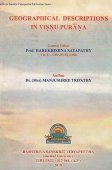Varsha, Varṣā, Varṣa, Vārṣa: 33 definitions
Introduction:
Varsha means something in Buddhism, Pali, Hinduism, Sanskrit, the history of ancient India, Marathi, Hindi. If you want to know the exact meaning, history, etymology or English translation of this term then check out the descriptions on this page. Add your comment or reference to a book if you want to contribute to this summary article.
The Sanskrit terms Varṣā and Varṣa and Vārṣa can be transliterated into English as Varsa or Varsha, using the IAST transliteration scheme (?).
Images (photo gallery)
(+11 more images available)
In Hinduism
Ayurveda (science of life)
Kalpa (Formulas, Drug prescriptions and other Medicinal preparations)
Source: Ancient Science of Life: Yogaśataka of Pandita VararuciVarṣa (वर्ष) refers to the “rainy season”, whose vāta-provocative symptoms are dealt with in the 10th century Yogaśataka written by Pandita Vararuci.—The Yogaśataka of Pandita Vararuci is an example of this category. This book attracts reader by its very easy language and formulations which can be easily prepared and have small number of herbs. It describes only those formulations which are the most common and can be used in majority conditions of diseases (viz., in Hemanta).
The 101st stanza is related with provocation of Doṣas in particular seasons. Seasons for provocation of Vāta are Hemanta (Jan-Feb), Varṣa (Rainy season) and Śiśira (Dec-Jan). Season for provocation of Pitta is Grīṣma (summer) and Śarad (Oct-Nov) while for provocation of Kapha is Vasanta (Feb-Mar).
Unclassified Ayurveda definitions
Source: Wisdom Library: Āyurveda and botanyVarṣā (मध्य, “rainy season”):—One of the six season of the year, comprising the months Śrāvaṇa and Bhādrapada.—This season takes place dusing visarga, when the moon is dominant, and releases nutrient essence to the living being. In these months, Vāyu-doṣa is aggrevated while Pitta-doṣa is accumulated. A skilled physician should moniter these conditions during the treatment of a patient.
Source: archive.org: Sushruta samhita, Volume IIVarsha is the Hindu season corresponding to “monsoon” / “rainy season”. The rains or the rainy season is marked by two months called Nabhas and Nabhasya (Shravana and Bhadra). Plants and vegetables (Oshadhis) that grow or sprout during Varsha (the rainy season), are matured in course of time and ripen in their virtues and potency in the season of Hemanta.
Subsequently wind thus accumulated in the summer, is agitated by the rains and cold winds in the forepart of Varsha (Pravrit) when the ground is flooded with water and thus gives rise to diseases which are incidental to a deranged state of the bodily wind. Likewise the features, which specifically mark the different seasons of the year are observed to characterise the different parts of a complete day and night, [or in other words] the evening is marked by those of Varsha (the rainy season).
During Varsha (the rainy season), the rivers overflow their banks, tumbling down the trees which grow on them. Ponds and lakes are decked with the full-blown Kumud and Nilotpala flowers. The earth is covered with profuse vegetation. All distinction between dry lands and reservoirs of water becomes impossible, and the sun and the planets are enveloped in dark clouds that shower torrents of rain but do not roar.

Āyurveda (आयुर्वेद, ayurveda) is a branch of Indian science dealing with medicine, herbalism, taxology, anatomy, surgery, alchemy and related topics. Traditional practice of Āyurveda in ancient India dates back to at least the first millenium BC. Literature is commonly written in Sanskrit using various poetic metres.
Purana and Itihasa (epic history)
Source: archive.org: Geography in Ancient Indian inscriptions (purāṇa)Varṣa (वर्ष) refers to “sub-continental region”.—Every varṣa has seven principal ranges styled kulaparvata (group mountain or clan mountain) besides a number of small hills (kṣudraparvata) which are situated near these.
Source: archive.org: Puranic Encyclopedia1) Varṣa (वर्ष).—The teacher of Vararuci. (For details see under Vararuci).
2) Varṣa (वर्ष).—See under Kālamāna.
Source: archive.org: Shiva Purana - English Translation1) Varṣā (वर्षा) refers to the “rainy seasons”, according to the Śivapurāṇa 2.2.22. Accordingly as Śiva said to Sitā:—“[...] O my beloved, beautiful woman, clouds will not reach the place where I have to make an abode for you. O comely lass! even in the rainy seasons (varṣā) the clouds move about in the side ridges alone of the Himālayas. O gentle lady, the clouds usually come only upto the foot of Kailāsa. They never go above it. The clouds never go above the mountain Sumeru. The clouds Puṣkara, Āvartaka etc. reach the foot of Jambu (and return). Of these mountains I have mentioned you can choose one for residence as you desire. Please tell me quickly where you wish to reside”.
2) Varṣa (वर्ष) or Varṣācala refers to a group of Mountains, according to the Śivapurāṇa 2.5.8 (“The detailed description of the chariot etc.”).—Accordingly, as Sanatkumāra narrated to Vyāsa: “The divine chariot of lord Śiva consisting of all the worlds was built by Viśvakarman with devoted effort. [...] The Lokāloka mountain formed its side steps. The lake Mānasa etc. constituted its brilliant outer and oblique steps. The Varṣa mountains (acala) constituted the cords and chains all round the chariot [pāśāssamaṃtatastasya sarve varṣācalāssmṛtāḥ ]. All the residents of the region Tala constituted the bottom surface of the chariot. [...]”
Source: Cologne Digital Sanskrit Dictionaries: The Purana Index1a) Varṣa (वर्ष).—A god of Sutāra group.*
- * Brahmāṇḍa-purāṇa IV. 1. 89.
1b) The mind-born son of Brahmā in the 16th kalpa.*
- * Vāyu-purāṇa 21. 35.
1c) One of the ten branches of Supāra devas.*
- * Vāyu-purāṇa 100. 94.
2) Varṣā (वर्षा).—Of the Dhruva Maṇḍala.*
- * Vāyu-purāṇa 51. 11.

The Purana (पुराण, purāṇas) refers to Sanskrit literature preserving ancient India’s vast cultural history, including historical legends, religious ceremonies, various arts and sciences. The eighteen mahapuranas total over 400,000 shlokas (metrical couplets) and date to at least several centuries BCE.
Kavya (poetry)
Source: Wisdom Library: KathāsaritsāgaraVarṣa (वर्ष) is the name of one of the two sons of Saṅkarasvāmin, a Brāhman from in the city of Pāṭaliputra. Their story was narrated to Vyāḍi and Indradatta in the tale called ‘the two Brāhman brothers’, according to Kathāsaritsāgara chapter 2.
The Kathāsaritsāgara (‘ocean of streams of story’), mentioning Varṣa, is a famous Sanskrit epic story revolving around prince Naravāhanadatta and his quest to become the emperor of the vidyādharas (celestial beings). The work is said to have been an adaptation of Guṇāḍhya’s Bṛhatkathā consisting of 100,000 verses, which in turn is part of a larger work containing 700,000 verses.
Source: Shodhganga: The Kavyamimamsa of RajasekharaVarṣa (वर्ष) is the name of an important person (viz., an Ācārya or Kavi) mentioned in Rājaśekhara’s 10th-century Kāvyamīmāṃsā.—An ācārya of grammar and prior to Pānīni. According to Rājaśekhara his poetic examine held on Pātaliputra.

Kavya (काव्य, kavya) refers to Sanskrit poetry, a popular ancient Indian tradition of literature. There have been many Sanskrit poets over the ages, hailing from ancient India and beyond. This topic includes mahakavya, or ‘epic poetry’ and natya, or ‘dramatic poetry’.
Vyakarana (Sanskrit grammar)
Source: Wikisource: A dictionary of Sanskrit grammarVarṣa (वर्ष).—Name of an ancient scholar of grammar and Mimamsa, cited by some as the preceptor of कात्यायन (kātyāyana) and Panini. If not of Panini, he may have been a preceptor of Katyayana

Vyakarana (व्याकरण, vyākaraṇa) refers to Sanskrit grammar and represents one of the six additional sciences (vedanga) to be studied along with the Vedas. Vyakarana concerns itself with the rules of Sanskrit grammar and linguistic analysis in order to establish the correct context of words and sentences.
Vaishnavism (Vaishava dharma)
Source: Pure Bhakti: Arcana-dipika - 3rd EditionVarṣa (वर्ष) refers to the “rainy” season and represents the months Āṣāḍha to Bhādrapadā (mid July to mid September) and is one of the six “seasons” (ṛtu).—According to the Vedic calendar, there are six different seasons, which correspond to the twelve months of the year.
Source: Pure Bhakti: Brhad BhagavatamrtamVarṣa (वर्ष) refers to:—Tract of land. (cf. Glossary page from Śrī Bṛhad-bhāgavatāmṛta).

Vaishnava (वैष्णव, vaiṣṇava) or vaishnavism (vaiṣṇavism) represents a tradition of Hinduism worshipping Vishnu as the supreme Lord. Similar to the Shaktism and Shaivism traditions, Vaishnavism also developed as an individual movement, famous for its exposition of the dashavatara (‘ten avatars of Vishnu’).
Shaktism (Shakta philosophy)
Source: Google Books: ManthanabhairavatantramVarṣa (वर्ष) refers to “lands” according to the Tantrāloka 37.35.—Accordingly, “There (in Bhuvar, the second of the seven worlds) of all the venerable (mahārgha) lands (varṣa) and islands where the gods enjoy themselves, the most excellent is the one called Kumārikā, where the wise have the sinless privilege (adhikṛti) to rise progressively from the lower level to the supreme that culminates in Śiva”.
Note: According to the cosmology of the Svacchandabhairavatantra (reproduced by Abhinava in chapter eight of his Tantrāloka), there are eight continents. Each of them lies beyond one of eight mountain chains that surround mount Meru in the centre. Bhārata is to the south of the Himalayan chain, which is itself south of Meru and is shaped like a bow. It differs from the other continents because the beings who inhabit most of it can only experience pleasure and pain (bhoga) and not produce Karma. Bhārata is divided into nine islands, separated from one another by seas. The island closest to the Himalayas is called Kumārikā. This is India.

Shakta (शाक्त, śākta) or Shaktism (śāktism) represents a tradition of Hinduism where the Goddess (Devi) is revered and worshipped. Shakta literature includes a range of scriptures, including various Agamas and Tantras, although its roots may be traced back to the Vedas.
Jyotisha (astronomy and astrology)
Source: Wisdom Library: Brihat Samhita by Varahamihira1) Varṣa (वर्ष) refers to 1 (one) solar year, according to the Bṛhatsaṃhitā (chapter 2), an encyclopedic Sanskrit work written by Varāhamihira mainly focusing on the science of ancient Indian astronomy astronomy (Jyotiṣa).—Accordingly, “We shall now proceed to give a brief description of (the qualifications of) a jyotiṣaka. [...] He must have a correct, knowledge of a yuga (43,20,000 Solar years), varṣa (a solar year), āyana (6 solar months), ṛtu (2 solar months), māsa (a solar month), pakṣa (15 solar days), ahorātra (a solar day), yama (one-eighth of a solar day), muhūrta (one-thirtieth of a solar day), nāḍī (one-sixtieth of a solar day or 24 minutes), vināḍi (one sixtieth of a nāḍī or 24 seconds), prāṇa (4 seconds) truṭi (33, 75th of a second) and parts of a truṭi and other divisions of time and also of divisions of space”.
2) Varṣā (वर्षा) refers to the months August and September, according to the Bṛhatsaṃhitā (chapter 3).—Accordingly, “If in Śiśira (February, March) the sun be of copper colour or red black, if, in Vasanta (April, May), blue crimson, if, in Grīṣma (June, July), slightly white and of gold color, if, in Varṣā (August, September), white, if, in Śarada (October, November), of the colour of the centre of the lotus, if, in Hemanta (December, January), of blood color, mankind will be happy. If, in Varṣā (August, September), the rays of the sun be soft, mankind will be happy even though the sun should be of any of the colors mentioned above”.

Jyotisha (ज्योतिष, jyotiṣa or jyotish) refers to ‘astronomy’ or “Vedic astrology” and represents the fifth of the six Vedangas (additional sciences to be studied along with the Vedas). Jyotisha concerns itself with the study and prediction of the movements of celestial bodies, in order to calculate the auspicious time for rituals and ceremonies.
Shaivism (Shaiva philosophy)
Source: Brill: Śaivism and the Tantric TraditionsVarṣa (वर्ष) refers to “rain”, according to the Guhyasūtra chapter 3.—Accordingly, “[...] If one torments the body (deha) with rain (varṣa), cold and heat, …, devoted to recitation and meditation, this is called the Great Observance. A woman skilled in the pleasures of love-making, endowed with beauty and youth; such a woman one should procure, holding one’s senses back from the objects of the senses, and one should kiss and embrace [her], placing the penis upon her sex while remaining focussed upon recitation and meditation—one performs [thus] the Sword-Blade Observance. If one should succumb to the control of desire, then one certainly falls into hell. [...]”.

Shaiva (शैव, śaiva) or Shaivism (śaivism) represents a tradition of Hinduism worshiping Shiva as the supreme being. Closely related to Shaktism, Shaiva literature includes a range of scriptures, including Tantras, while the root of this tradition may be traced back to the ancient Vedas.
Sports, Arts and Entertainment (wordly enjoyments)
Source: archive.org: Syainika Sastra of Rudradeva with English Translation (art)Varṣa (वर्ष) refers to the “rainy season”, according to the Śyainika-śāstra: a Sanskrit treatise dealing with the divisions and benefits of Hunting and Hawking, written by Rājā Rudradeva (or Candradeva) in possibly the 13th century.—Accordingly, “[...] Pure and unmixed enjoyment, unconnected with any of these, is nowhere to be found. The enjoyment of wearing good garlands, anointing with sandal-paste (candana) and eating choice food is said to be connected with them. Therefore, the spring season, the rainy season (varṣa), the moon-rise, sandal-paste and so on, are sources of delight to those only who enjoy the company of their beloved, but are sources of annoyance to those who are separated from their sweethearts. [...]”.

This section covers the skills and profiencies of the Kalas (“performing arts”) and Shastras (“sciences”) involving ancient Indian traditions of sports, games, arts, entertainment, love-making and other means of wordly enjoyments. Traditionally these topics were dealt with in Sanskrit treatises explaing the philosophy and the justification of enjoying the pleasures of the senses.
General definition (in Hinduism)
Source: archive.org: Vedic index of Names and SubjectsVarṣa (वर्ष) denotes primarily ‘rain’, then ‘rainy season’ and ‘year’.
In Buddhism
Tibetan Buddhism (Vajrayana or tantric Buddhism)
Source: Wisdomlib Libary: VajrayoginiVarṣa (वर्ष) is the name of a cloud (megha) associated with Ghorāndhakāra: the south-western cremation ground (śmaśāna) according to the Vajravārāhī-sādhana by Umāpatideva as found in te 12th century Guhyasamayasādhanamālā. The name for the cloud of the southern direction is sometimes given as Varṣaṇa. As a part of this sādhana, the practicioner is to visualize a suitable dwelling place for the goddess inside the circle of protection which takes the form of eight cremation grounds.
These clouds (e.g., Varṣa) are known as cloud-kings (megharāja) and have names that are associated with the loud noises of thunderclouds and the noise of rain, according to the Guhyasamayasādhanamālā 11.77. Their presence in the cremation grounds may be connected with the nāgas, for they are known to be responsible for the rain.

Tibetan Buddhism includes schools such as Nyingma, Kadampa, Kagyu and Gelug. Their primary canon of literature is divided in two broad categories: The Kangyur, which consists of Buddha’s words, and the Tengyur, which includes commentaries from various sources. Esotericism and tantra techniques (vajrayāna) are collected indepently.
Mahayana (major branch of Buddhism)
Source: academia.edu: A Study and Translation of the GaganagañjaparipṛcchāVarṣa (वर्ष) refers to the “rain (of the dharma)”, according to the Gaganagañjaparipṛcchā: the eighth chapter of the Mahāsaṃnipāta (a collection of Mahāyāna Buddhist Sūtras).—Accordingly, “What then, the son of good family, is memory (dhāraṇī)? [...] This is called memory. When his body, speech, and mind are included in a state which is like the earth (dharaṇi), such are imperishable, the rain of the dharma (dharma-varṣa) falls, pacifies the burning pains of vices, and makes all qualities of the Buddha grow. This is way of entering the way of memory. He who has attained memory (dhāraṇī) knows the practice that is never forgetting any dharma of the Buddha. In this way, son of good family, the Bodhisattva who has attained memory practices not forgetting”.

Mahayana (महायान, mahāyāna) is a major branch of Buddhism focusing on the path of a Bodhisattva (spiritual aspirants/ enlightened beings). Extant literature is vast and primarely composed in the Sanskrit language. There are many sūtras of which some of the earliest are the various Prajñāpāramitā sūtras.
India history and geography
Source: archive.org: Personal and geographical names in the Gupta inscriptionsVarṣa (वर्ष) refers to a suffix for place-names mentioned in the Gupta inscriptions. The Gupta empire (r. 3rd-century CE), founded by Śrī Gupta, covered much of ancient India and embraced the Dharmic religions such as Hinduism, Buddhism and Jainism. The termination varṣa is significant. It denotes a division of the earth as separated off by mountain ranges. From the Purāṇas we know of such names as Harivarṣa, Kiṃpuruṣa-varṣa and Bhārata-varṣa. Varṣam in Pāṇini (3.3.56) means the rainy season.
Source: Cologne Digital Sanskrit Dictionaries: Indian Epigraphical GlossaryVarṣa.—(CII 3, 4; IA 17), a year; used for saṃvatsara or its abbreviations. (EI 23), the rainy season. Cf. varṣe (IA 19), used in the dates after the quotation of saṃvat; sometimes abbreviated to va. Cf. samaye used in the same sense. Cf. Tamil varuṣa-kāṇikkai (SITI), annual presents. (IE 7-1-2), ‘nine’; cf. the nine divisions of Jambu-dvīpa. Note: varṣa is defined in the “Indian epigraphical glossary” as it can be found on ancient inscriptions commonly written in Sanskrit, Prakrit or Dravidian languages.

The history of India traces the identification of countries, villages, towns and other regions of India, as well as mythology, zoology, royal dynasties, rulers, tribes, local festivities and traditions and regional languages. Ancient India enjoyed religious freedom and encourages the path of Dharma, a concept common to Buddhism, Hinduism, and Jainism.
Languages of India and abroad
Marathi-English dictionary
Source: DDSA: The Molesworth Marathi and English Dictionary1) Varṣa (वर्ष).—n (S) A year. varṣācyā kāṇṭhīṃ Within the or a year.
varṣa (वर्ष).—m S A division of the continent as known or apprehended by the Hindus. Nine varṣa are reckoned; viz. kuru, hiraṇmaya, rōmānaka, ilāvṛtta, harī, kētumālā, bhādrāsvā, kinnara, bharata.
varṣa (वर्ष).—m S Raining.
2) varṣā (वर्षा).—f S varṣākāla m (S) The rainy season.
Source: DDSA: The Aryabhusan school dictionary, Marathi-English1) Varṣa (वर्ष).—n A year. varṣācyā kāṇṭhīṃ Within the or a year. Sometimes a division of the continent, bhāratavarṣa.
varṣa (वर्ष).—m Raining.
2) varṣā (वर्षा).—f-varṣāṛtu-kāla m The rainy season.
Marathi is an Indo-European language having over 70 million native speakers people in (predominantly) Maharashtra India. Marathi, like many other Indo-Aryan languages, evolved from early forms of Prakrit, which itself is a subset of Sanskrit, one of the most ancient languages of the world.
Sanskrit dictionary
Source: DDSA: The practical Sanskrit-English dictionaryVarṣa (वर्ष).—[vṛṣ bhāve ghañ kartari ac vā]
1) Raining, rain, a shower of rain; तपाम्यहमहं वर्षं निगृह्णाभ्युत्सृजामि च (tapāmyahamahaṃ varṣaṃ nigṛhṇābhyutsṛjāmi ca) Bhagavadgītā (Bombay) 9.19; विद्युत्स्तनितवर्षेषु (vidyutstanitavarṣeṣu) Manusmṛti 4.13; Meghadūta 37.
2) Sprinkling, effusion, throwing down, a shower of anything; सुरभि सुरविमुक्तं पुष्पवर्षं पपात (surabhi suravimuktaṃ puṣpavarṣaṃ papāta) R.12.12; so शरवर्षः, शिलावर्षः, लाजवर्षः (śaravarṣaḥ, śilāvarṣaḥ, lājavarṣaḥ) &c.
3) Seminal effusion.
4) A year (usually only n.); इयन्ति वर्षाणि तया सहोग्रमभ्यस्यतीव व्रतमासिधारम् (iyanti varṣāṇi tayā sahogramabhyasyatīva vratamāsidhāram) R.13.67; न ववर्ष वर्षाणि द्वादश दशशताक्षः (na vavarṣa varṣāṇi dvādaśa daśaśatākṣaḥ) Dk.; वर्षभोग्येण शापेन (varṣabhogyeṇa śāpena) Meghadūta 1.
5) A division of the world, a continent; (nine such divisions are usually enumerated:-1 kuru; 2 hira- ṇmaya; 3 ramyaka; 4 ilāvṛta; 5 hari; 6 ketumālā; 7 bhadrāśva; 8 kiṃnara; and 9 bhārata); यस्मिन् नव वर्षाणि (yasmin nava varṣāṇi) Bhāgavata 5.16.6. एतदूढगुरुभारभारतं वर्षमद्य मम वर्तते वशे (etadūḍhagurubhārabhārataṃ varṣamadya mama vartate vaśe) Śiśupālavadha 14.5.
6) India (= bhāratavarṣa).
7) A cloud (only m. according to Hemachandra).
8) A day; अप्राप्तयौवनं बालं पञ्चवर्षसहस्रकम् (aprāptayauvanaṃ bālaṃ pañcavarṣasahasrakam) Rām.7.73.5. (com. varṣaśabdo'tra dinaparaḥ).
9) A place of residence; वर्षमस्य गिरेर्मध्ये रामेण श्रीमता कृतम् (varṣamasya girermadhye rāmeṇa śrīmatā kṛtam) Mahābhārata (Bombay) 3. 13.12.
Derivable forms: varṣaḥ (वर्षः), varṣam (वर्षम्).
--- OR ---
Varṣā (वर्षा).—(Usually f. pl.)
1) The rainy season, the rains, the monsoon; ग्रीष्मे पञ्चाग्निमध्यस्थो वर्षासु स्थण्डिलेशयः (grīṣme pañcāgnimadhyastho varṣāsu sthaṇḍileśayaḥ) Y.3. 52; Bhaṭṭikāvya 7.1.
2) Rain (sing. in this sense).
--- OR ---
Vārṣa (वार्ष).—a. (-rṣī f.) [वर्ष-अण् (varṣa-aṇ)]
1) Belonging to the rains.
2) Annual.
Source: Cologne Digital Sanskrit Dictionaries: Shabda-Sagara Sanskrit-English DictionaryVarṣa (वर्ष).—mn.
(-rṣaḥ-rṣaṃ) 1. Rain, raining. 2. Sprinkling, effusion. 3. Seminal effusion. 4. A year. 5. A Varsha, or division of the known continent; nine such are reckoned; viz:—Kuru, Hiranmaya, Ramyaka, Ilavrita, Hari, Ketumala, Bhadrashwa, Kin- Nara, and Bharata. 5. Jambu-Dwipa, or India. 6. A cloud. m. plu.
(-rṣāḥ) The rains or rainy season, containing two months, according to the Hindu classification of the seasons, which some systems consider to be Shravana and Bhadra, and others, Bhadra and Aśhwin; the duration of the monsoon is however longer, being reckoned from A sarha to Kartika, or from the middle of June to the beginning of October. f. Sing.
(-rṣā) A sort of gramineous plant: see pṛkkā. E. vṛṣ to sprinkle, aff. ac or ghañ; or vṝ to screen, &c., Unadi aff. sa .
--- OR ---
Vārṣa (वार्ष).—mfn.
(-rṣaḥ-rṣī-rṣaṃ) Belonging to a year, to the rains, &c. E. varṣa, aṇ aff.
Source: Cologne Digital Sanskrit Dictionaries: Benfey Sanskrit-English DictionaryVarṣa (वर्ष).—i. e. vṛṣ + a, I. adj. at the end of a comp. Raining, [Hitopadeśa] ii. [distich] 147. Ii. m. and n. 1. Rain, [Meghadūta, (ed. Gildemeister.)] 36; figurat.,
Varṣa (वर्ष).—[adjective] raining (—°); [neuter] [masculine] rain ([neuter] [plural] the rains as a season), a year, a part of the world; [masculine] [Name] of a grammarian; [feminine] ā rain, [plural] (sgl.) the rains.
--- OR ---
Vārṣa (वार्ष).—[feminine] ī belonging to the rainy season.
Source: Cologne Digital Sanskrit Dictionaries: Monier-Williams Sanskrit-English Dictionary1) Varṣa (वर्ष):—a mf(ā)n. ([from] √vṛṣ) raining (ifc. e.g. kāma-v, raining according to one’s wish), [Bhāgavata-purāṇa]
2) m. and (older) n. (ifc. f(ā). ) rain, raining, a shower (either ‘of rain’, or [figuratively] ‘of flowers, arrows, dust etc.’; also applied to seminal effusion), [Ṛg-veda] etc. etc.
3) ([plural]) the rains, [Atharva-veda] (cf. varṣā f.)
4) a cloud, [cf. Lexicographers, esp. such as amarasiṃha, halāyudha, hemacandra, etc.]
5) a year (commonly applied to age), [Brāhmaṇa] etc. etc. (ā varṣāt, for a whole year; varṣāt, after a year; varṣeṇa within a year; varṣe every year)
6) a day (?), [Rāmāyaṇa vii, 73, 5] ([Scholiast or Commentator])
7) a division of the earth as separated off by certain mountain ranges (9 such divisions are enumerated, viz. Kuru, Hiraṇmaya, Ramyaka, Ilāvṛta, Hari; Ketu-mālā, Bhadrāśva, Kiṃnara, and Bhārata; sometimes the number given is 7), [Mahābhārata; Purāṇa] (cf. [Indian Wisdom, by Sir M. Monier-Williams 420])
8) India (= bhāratavarṣa and jambu-dvīpa), [cf. Lexicographers, esp. such as amarasiṃha, halāyudha, hemacandra, etc.]
9) Name of a grammarian, [Kathāsaritsāgara]
10) Varṣā (वर्षा):—[from varṣa] a f. See p. 927, col. 2.
11) [from varṣa] b f. rain, [Śāṅkhāyana-gṛhya-sūtra; Varāha-mihira’s Bṛhat-saṃhitā]
12) [v.s. ...] [plural] (exceptionally sg.) the rains, rainy season, monsoon (lasting two months accord. to the Hindū division of the year into six seasons [see ṛtu], the rains falling in some places during Śrāvaṇa and Bhādra, and in others during Bhādra and Āśvina, and in others for a longer period), [Taittirīya-saṃhitā] etc. etc.
13) [v.s. ...] Medicago Esculenta, [cf. Lexicographers, esp. such as amarasiṃha, halāyudha, hemacandra, etc.] cf. [Greek] ἐέρσαι, ‘rain-drops.’
14) Vārśa (वार्श):—n. ([from] vṛśa) Name of a Sāman, [Pañcaviṃśa-brāhmaṇa]
15) Vārṣa (वार्ष):—1. vārṣa mf(ī)n. ([from] varṣa or varṣā) belonging to the rainy season, [Vājasaneyi-saṃhitā]
16) belonging to a year, yearly, annual, [Horace H. Wilson]
17) 2. vārṣa Vṛddhi form of varṣa in [compound]
18) 3. vārṣa n. ([from] vṛṣa of which it is also the Vṛddhi form in [compound]) [gana] pṛthv-ādi
19) Name of a Sāman, [cf. Lexicographers, esp. such as amarasiṃha, halāyudha, hemacandra, etc.]
20) Varṣa (वर्ष):—[from vṛṣ] b See p.926etc.
Source: Cologne Digital Sanskrit Dictionaries: Yates Sanskrit-English Dictionary1) Varṣa (वर्ष):—(ṅa) varṣati 1. a. To be wet.
2) [(rṣaḥ-rṣaṃ)] 1. m. n. Rain; a year; division of the continent; a cloud; plu. the rains. f. A grass.
3) Vārṣa (वार्ष):—[(rṣaḥ-rṣī-rṣaṃ) a.] Of the year or the rains.
Source: DDSA: Paia-sadda-mahannavo; a comprehensive Prakrit Hindi dictionary (S)Varṣa (वर्ष) in the Sanskrit language is related to the Prakrit words: Varisa, Varisā.
[Sanskrit to German]
Sanskrit, also spelled संस्कृतम् (saṃskṛtam), is an ancient language of India commonly seen as the grandmother of the Indo-European language family (even English!). Closely allied with Prakrit and Pali, Sanskrit is more exhaustive in both grammar and terms and has the most extensive collection of literature in the world, greatly surpassing its sister-languages Greek and Latin.
Hindi dictionary
Source: DDSA: A practical Hindi-English dictionary1) Varṣa (वर्ष) [Also spelled varsh]:—(nm) a year; vast tract of land (as [bhāratavarṣa); ~gāṃṭha] birthday, birth anniversary; -[praveśa] the beginning of a new year; ~[bodha] an yearbook; ~[phala] astrological predictions for a (particular) year.
2) Varṣā (वर्षा):—(nf) rain; rainfall; -[kāla] rainy season; -[jala] rain water.
...
Kannada-English dictionary
Source: Alar: Kannada-English corpusVarṣa (ವರ್ಷ):—
1) [noun] water that is condensed from the aqueous vapour in the atmosphere and falls to earth in drops; rain.
2) [noun] any thing falling contiuously and widely, resembling rainfall.
3) [noun] forceful ejection of semen.
4) [noun] a period of twelve months; a year.
5) [noun] one of the nine mythological division of the earth.
6) [noun] the Indian subcontinent (extending from the west of Afghanistan to the east of Bangladesh, and from the southern border of China to the southernmost point of Sri Lanka.
7) [noun] a cloud.
8) [noun] the 24 hours period from midnight to midnight (or from sunrise to the next sunrise); a day.
9) [noun] ವರ್ಷದ ಹೆಚ್ಚು [varshada heccu] varṣada heccu celebration of the child’s birthday after one year of its birth.
--- OR ---
Vārṣa (ವಾರ್ಷ):—
1) [adjective] characterised by rain or relating to rainy season; rainy.
2) [adjective] happening or appearing once a year; yearly; annual.
--- OR ---
Vārṣa (ವಾರ್ಷ):—[noun] a particular kind of medicinal creeper of Papilionaceae (Dalbergia) family.
Kannada is a Dravidian language (as opposed to the Indo-European language family) mainly spoken in the southwestern region of India.
See also (Relevant definitions)
Starts with (+217): Varsha-granthi, Varsha-paryushita, Varsha-pattukattu, Varsha-vartamani, Varshaabhu, Varshabandhana, Varshabandhanasamagri, Varshabandhanavidhi, Varshabdika, Varshabha, Varshabhahkara, Varshabhanavi, Varshabhaskara, Varshabhava, Varshabhavadhyaya, Varshabhoo, Varshabhra, Varshabhu, Varshabhuj, Varshabhukalpa.
Ends with (+167): Abhivarsha, Abhravarsha, Adharavarsha, Adhikavarsha, Adhivarsha, Advivarsha, Agnivarsha, Airavatavarsha, Ajavarsha, Akalavarsha, Alamvarsha, Amoghavarsha, Amritavarsha, Angaravarsha, Antaravarsha, Antarvarsha, Anuvarsha, Aparavarsha, Ardhavarsha, Arkavarsha.
Full-text (+811): Varisa, Bharatavarsha, Harivarsha, Varshaprabhanjana, Dvivarsha, Varshaghosha, Varshaparvata, Varshacara, Varshabhu, Varshakala, Upavarsha, Sharavarsha, Varshabhvi, Avarsha, Varshabhava, Varshagana, Varshanga, Varshavasaya, Nabhivarsha, Parvatiya-varsha.
Relevant text
Search found 98 books and stories containing Varsha, Varṣā, Varṣa, Varsa, Vārṣa, Vārśa; (plurals include: Varshas, Varṣās, Varṣas, Varsas, Vārṣas, Vārśas). You can also click to the full overview containing English textual excerpts. Below are direct links for the most relevant articles:
Brihad Bhagavatamrita (commentary) (by Śrī Śrīmad Bhaktivedānta Nārāyana Gosvāmī Mahārāja)
Verse 2.2.107 < [Chapter 2 - Jñāna (knowledge)]
Verse 2.2.8-9 < [Chapter 2 - Jñāna (knowledge)]
Verse 1.4.50 < [Chapter 4 - Bhakta (the devotee)]
Amarakoshodghatana of Kshirasvamin (study) (by A. Yamuna Devi)
Miscellaneous (1): Geographical Data < [Chapter 3 - Social Aspects]
Day and night for the Manes, Gods and Brahma < [Chapter 3 - Social Aspects]
Units of time < [Chapter 3 - Social Aspects]
Mahabharata (English) (by Kisari Mohan Ganguli)
Section VI < [Jambukhanda Nirmana Parva]
Section VIII < [Jambukhanda Nirmana Parva]
Section XII < [Bhumi Parva]
The Matsya Purana (critical study) (by Kushal Kalita)
Part 1 - Bhūvanakoṣa: Geography of Seven Continents (saptadvīpā) < [Chapter 8 - Geographical data in the Matsyapurāṇa]
Geographical Aspects of the Purāṇas (Introduction) < [Chapter 8 - Geographical data in the Matsyapurāṇa]
Part 2 - Rivers and Mountains of Bhāratavarṣa < [Chapter 8 - Geographical data in the Matsyapurāṇa]
The Bhagavata Purana (by G. V. Tagare)
Chapter 17 - The Descent of the Gaṅgā < [Book 5 - Fifth Skandha]
Chapter 16 - Dialogue between the Earth and Dharma < [Book 1 - First Skandha]
Chapter 20 - Description of the remaining six Dvīpas < [Book 5 - Fifth Skandha]
Related products









